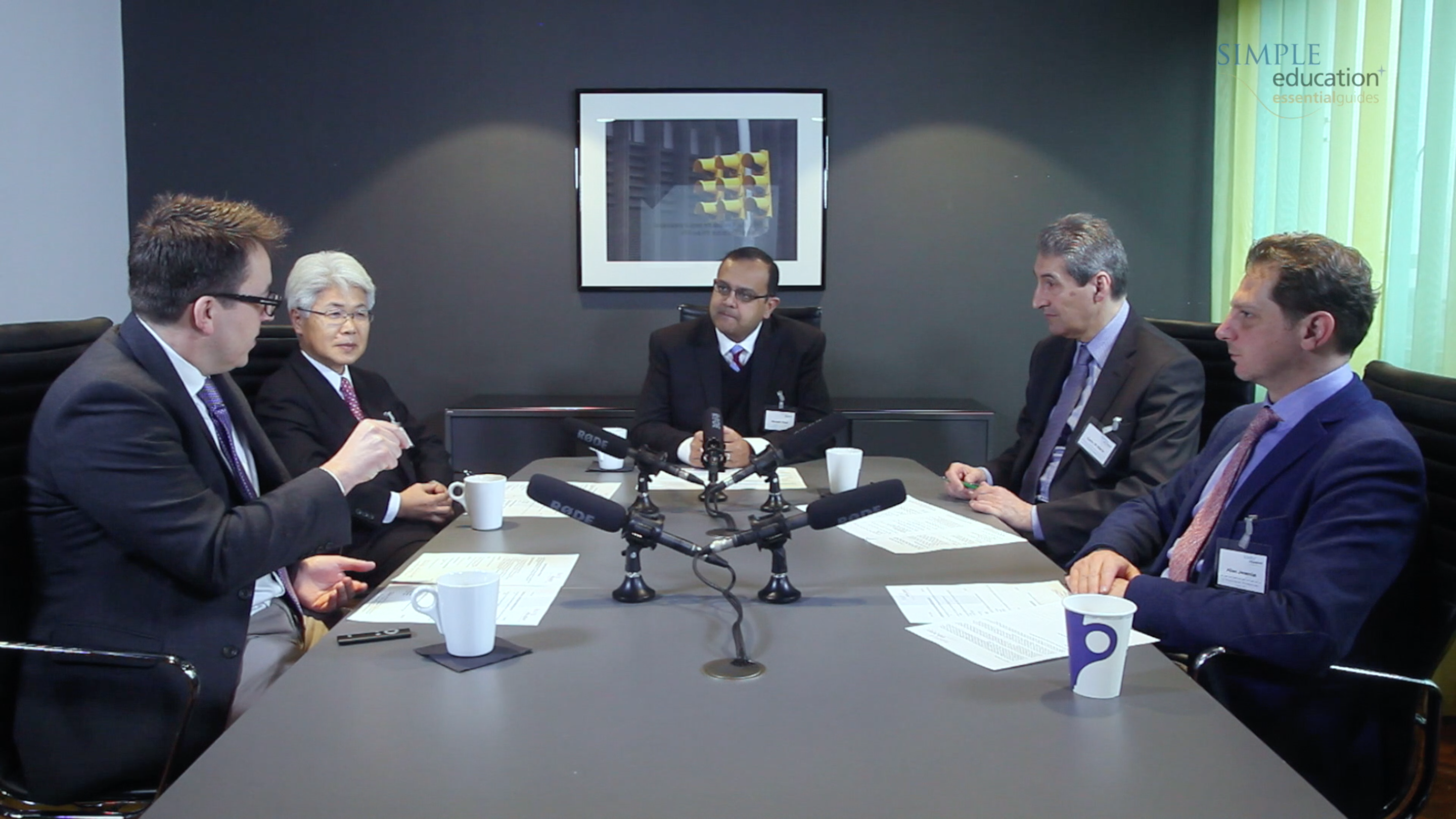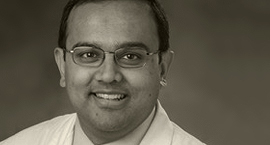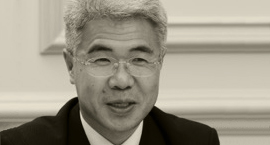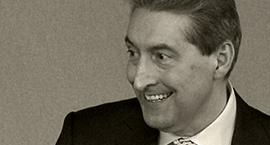
During the "Advances in Coronary Physiology" course in London 2017, Simple Education, in association with Radcliffe Cardiology, filmed a roundtable discussion focused around the impact of the DEFINE-FLAIR clinical trial results presented as a Late-Breaking Trial at the American College of Cardiology (ACC) 2017 on 18th March 2017.
The meeting comprised of six panel discussions on a range of topical issues related to all aspects of coronary physiology
SESSION 1 / DEFINE FLAIR – STUDY DESIGN & RESULTS
SESSION 2 / DEFINE FLAIR – HOW SHOULD WE INTERPRET THE RESULTS?
SESSION 3 / GUIDELINES
SESSION 4/ CORONARY PHYSIOLOGY USE & ADOPTION
SESSION 5/ FUTURE CONSIDERATIONS
SESSION 6/ QUICK FIRE DEBATE SESSION
Learn more about state-of-the-art coronary physiology from one of the Advances in Coronary Physiology Course.

Dr. Manesh Patel is the Chief of the Division of Cardiology and the Division of Clinical Pharmacology. His clinical interests include diagnostic and interventional coronary angiography, peripheral angiography and endovascular intervention. His is involved in several clinical trials involving patients with cardiovascular disease and in cardiac imaging. He is also the Chair of the American College of Cardiology Task Force for Appropriate Use Criteria for Cardiovascular Procedures and is Chair of the American Heart Association Diagnostic and Interventional Cath Committee.
Patel's interest in cardiac imaging, quality of care, cardiac devices is also evident in his research. His integration of these efforts into his roles at Duke was recognized in 2010 when he received the prestigious Duke Cardiology Fellowship Mentor Award. In 2011, Dr. Patel was named the endowed John Bush Simpson Assistant Professor of Cardiology. In 2013, Dr. Patel received the Robert M. Califf Faculty clinical research Award.
Currently, Dr. Patel is leading an effort to redesign the delivery of care to patients undergoing invasive catheterization procedures in the health system with a specific aim of measure and providing individualized, patient centered, innovative, and efficient care.

Prof Takashi Akasaka graduated from Wakayama Medical University in 1982 and finished his residency at Kobe City Medical Center General Hospital. He was a clinical fellow at Harefield Hospital in the United Kingdom in 1987. Since 1989, he had done clinical research work in the field of coronary physiology using echocardiography, pressure wire and flow wire extensively at Kobe City Medical Center General Hospital as a director of cardiac catheterization laboratory for 8 years. After he moved to Kawasaki Medical School as an associate professor, he started OCT in addition to coronary physiology in 1999. He became Professor of Wakayama Medical University in 2005 and he has been devoted to the clinical research work using OCT. He has published many papers regarding the pathophysiology of ACS or DES healing process using OCT in collaboration with his colleagues in addition to coronary physiology research. Based on his clinical and research work, he has been an executive board member in various cardiology societies and a course co- director of several coronary live-demonstration courses in the world.
 Prof Carlo Di Mario is currently Full Professor of Cardiology at University of Florence, Italy. He served until recently as Professor of Clinical Cardiology, NHLI, Imperial College of Sciences, Medicine & Technology, London and theme leader of the area Complex Coronary Artery Disease of the Cardiovascular Biomedical Research Unit of the Royal Brompton & Harefield Foundation Trust. He was appointed in 2010 Senior Investigator of the National Institute of Health Research and maintains an active clinical involvement having performed more than 200 PCI per year in the last 10 years with the special interest in the treatment of chronic total occlusions, bifurcations, calcified lesions and diffuse disease. He is a regular TAVI operator and certified implanter for the Medtronic CoreValve and Edwards Sapien transcatheter aortic valves.
Prof Carlo Di Mario is currently Full Professor of Cardiology at University of Florence, Italy. He served until recently as Professor of Clinical Cardiology, NHLI, Imperial College of Sciences, Medicine & Technology, London and theme leader of the area Complex Coronary Artery Disease of the Cardiovascular Biomedical Research Unit of the Royal Brompton & Harefield Foundation Trust. He was appointed in 2010 Senior Investigator of the National Institute of Health Research and maintains an active clinical involvement having performed more than 200 PCI per year in the last 10 years with the special interest in the treatment of chronic total occlusions, bifurcations, calcified lesions and diffuse disease. He is a regular TAVI operator and certified implanter for the Medtronic CoreValve and Edwards Sapien transcatheter aortic valves.
In 2014 he successfully led a bid for the commissioning of MitraClip in his hospital (40/year for 3 years, worth £3.6 million only for the devices). He holds an NHS Bronze National Award. Professor Di Mario pioneered the use of intracoronary Doppler, pressure measurement, ultrasound and optical coherence tomography. These techniques have become the gold standard for physiological assessment of lesion severity and have revolutionised the technique of stent implantation with the use of high pressure dilatation which led to the universal application of this method in interventional cardiology. Professor Di Mario is now applying these intravascular techniques for the guidance of implantation of fully bioabsorbable stents and optimal stent apposition across bifurcations and in complex lesions. He has led or participated in studies and trials to improve technical success of recanalisation of chronic total occlusion and demonstrate its clinical usefulness. He cooperated with Dr J. Davies to the development of the concept of iFR to facilitate assessment of lesion severity and discriminate the contribution of individual lesions, and with Dr A Lyon to the intracoronary delivery of SERCA-2 genes via adenoviral vectors in the CUPID2 trial. Prof Di Mario was Principal Investigator of the CARESS in AMI trial, a large multicentre trial showing that patients who receive fibrinolytic therapy for ST-elevation myocardial infarction benefit from early angioplasty. This trial and a subsequent meta-analysis have led to a change in the European Society of Cardiology and AHA/ACC Guidelines for treatment of STEMI patients.

Dr. Justin Davies is a leading clinical academic in the field of interventional cardiology. Based as a consultant interventional cardiologist at Hammersmith Hospital, part of Imperial College Healthcare NHS Trust London, he has pioneered the development of several new clinical techniques from bench top to the clinical catheter laboratory. Most recently these technological breakthroughs include iFR (instant wave-free ratio) and iFR SCOUT both of which make use of a better understanding of coronary haemodynamics. Together with improved sensor and microprocessor technology, iFR allow for the first time the evaluation of the severity of a coronary stenosis without the need for administration of powerful vasodilator drugs.
Although currently a practicing interventional consultant cardiologist, Justin’s science training was a doctorate in fluid dynamics and computational programming. This led to the development of analysis techniques such as coronary wave intensity analysis and the wave-reservoir theory both of which are increasingly used in research studies. In his post-doctoral days he has continued to work on the development of mathematical algorithms to aid understanding of large artery physiology and to develop new tools to assess arterial disease.
The holder of 15 patents, he has published widely in the field of hypertension, coronary and large artery physiology and is the winner of many national and international awards. He has several international collaborations, and is the developer of iFR and the co-principal investigator of the ADVISE studies, the DEFINE-FLAIR, and ORBITA studies.
Justin has an interest in renal denervation, and has lead first-in-man studies to evaluate the safety of this technique to patients with chronic systolic heart failure (REACH studies) and hypertension.

Dr Allen Jeremias is the Director of Interventional Cardiology Research and Associate Director of the Cardiac Catheterization Laboratory of S. Francis Hospital, Roslyn, New York, USA. He previously served as the Director of the Cardiac Catheterization Laboratory and the Director of the Chest Pain Center at Stony Brook University Medical Center. He is also a member of the Cardiovascular Research Foundation, NY, where he currently serves as the Director of the Physiology Core Laboratory.
Dr. Jeremias earned his medical degree at Heinrich-Heine-University School of Medicine in Düsseldorf, Germany, and a Master of Science degree at Harvard Medical School. He completed his medical training at The Cleveland Clinic Foundation, Stanford University School of Medicine, as well as Beth Israel Deaconess Medical Center, Harvard Medical School.
Board certified in cardiovascular medicine and interventional cardiology, Dr. Jeremias is a Fellow of the American College of Cardiology as well as the Society for Cardiovascular Angiography and In¬terventions. He has numerous publications in the area of interventional cardiology and is the editor of the medical text, Cardiac Intensive Care.
This broadcast is supported by Philips Volcano